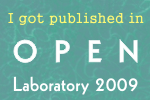A new paper from my lab and Patsy Babbitt’s lab in UCSF has recently been published in PLoS Computational Biology. It is something of a cautionary tale for quantitative biologists, especially bioinformaticians and system biologists. Genomics has ushered biology into the data rich sciences. Bioinformatics, developing alongside genomics, provided the tools necessary to decipher genomic […]
You have until Friday Saturday, April 20th to submit your abstracts to the Automated Function Prediction meeting, an ISMB 2013 Special Interest Group and CAFA: Critical Assessment of Function Annotations. Keynote speakers: Patricia Babbitt, University of California, San Francisco. Protein similarity networks: Identification of functional trends from the context of sequence similarity Alex Bateman, European Bioinformatics […]
The Automated Function Prediction, an ISMB 2013 Special Interest Group meeting and CAFA: Critical Assessment of Function Annotations. July 20, 2013, Berlin Keynote speakers Patricia Babbitt, University of California, San Francisco Alex Bateman, European Bioinformatics Institute Anna Tramontano, “La Sapienza” University, Rome. Key dates: April 20, 2013: Deadline for submitting extended abstracts posters & talks May […]
From the organizers of CAGI 2013. I have been to the Critical Assessment in 2010 and 2011, and even participated as an assessor. It’s a fun meeting, and if your work involves prediction of phenotypes from genotypes, there is still time (just about) to accept some of the challenges. The Critical Assessment of Genome Interpretation […]
Back to ancient life, what exactly defines life, and where does life end and non-life begin. One of my favorite subjects, and one of which I am the least knowledgeable. Doesn’t stop me writing about it though. Viruses are… well… not really life. Or so says common wisdom. They have some elements of life: a […]
There has been a lot of discussion recently on this blog and others on the need for robust scientific software. Most of the discussion I have been involved in comes from bioinformaticians, because, well, I am one. There has been plenty of talk about code robustness, sharing, and replicability vs. reproduciblity. I do not want […]
So there was a lot written over the blogosphere, twittersphere and what-have-you-sphere about the to publish code in scientific research. The latest volley was fired from a post at biostars.org from “JermDemo” which also mentioned my post on making accountable research software by forming a volunteer “Bioinformatics Testing Consortium”. (My post, not my idea). I won’t […]
Our lab has a new project and website up. The project is BioDIG: Biological Database of Images and Genomes. BioDIG lets you combine image data and genome data of, well, just about anything which you can make images and have a genome, or partial genomic information. You can upload your image, annotate (tag) parts of […]
My previous post on ROSALIND, a bioinformatics learning site, got picked up by the Slashdot community. A discussion came up on careers in Bioinformatics, and the Slashdot user rockmulle made some interesting observations on career paths in bioinformatics, which I have copied here. While brief and therefore omitting many important details (research at a university […]
I just learned about this one: ROSALIND is a really cool concept in learning bioinformatics. You are given problems of increasing difficulty to solve. Start with nucleotide counting (trivial) and end with genome assembly (not so trivial). To solve a problem, you download a sample data set, write your code and debug it. Once […]
Improve wikipedia entries in computational biology, and you too can win cash prizes, a free membership to International Society of Computational Biology, or a dinner date with an ISCB officer of your choice! OK, maybe not the last one, but definitely the first two. The ISCB is announcing a competition to improve Wikipedia entries that have to […]
I recently read this post about lacunae in Bioinformatics. One complaint was: I know that documentation is a thankless task. But some parts of the Bio[Java|Perl|Python] libraries are described only as an API? This became apparent to me when I had to teach the libraries to students. What does this module do and why does it do […]
So there have been a few reactions to my latest post on accountable research software, including a Tweeter kerfuffle (again). Ever notice how people come out really aggressive on Twitter? Must the the necessity to compress ideas into 140chars. You can’t just write “Interesting point you make there, sir. Don’t you think that your laudable goal would […]
Preamble: this post is inspired by a series of tweets that took place over the past couple of days. I am indebted to Luis Pedro Coelho (@LuisPedroCoelho) and to Robert Buels (@rbuels) for a stimulating, 140-char-at-a-time discussion. Finally, my thanks (and yours, hopefully) to Ben Temperton for initiating the Bioinformatics Testing Consortium. Science is messing around with […]





